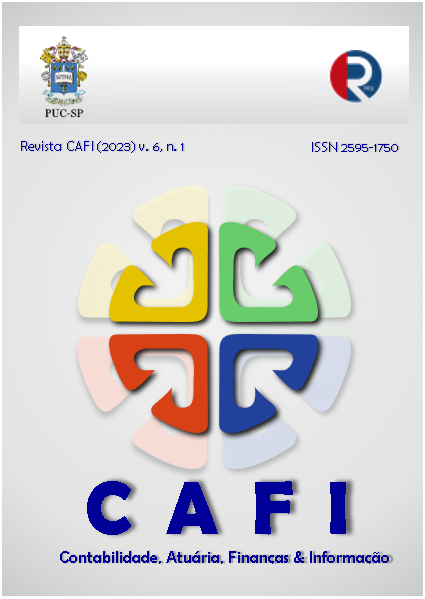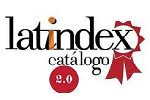Study of the prevention and detection of financial fraud through machine learning techniques
DOI:
https://doi.org/10.23925/cafi.v6i1.58372Keywords:
Financial fraud, Artificial intelligenge, Supervised techniques, Fraud detection, Data miningAbstract
Many organizations are currently affected by financial fraud, becoming a current concern for the financial area of any entity, since when it materializes, it directly harms the assets of any public or private company. To do this, and in response to this problem, supervised and unsupervised techniques have been implemented that use artificial intelligence for the prevention and early detection of these frauds and, thus, minimize risks in financial operations. Due to the above, the study analyzes the use of supervised techniques, their referential status through scientometric and bibliometric analysis, determining their importance for the prevention and detection of financial fraud. At the methodological level, it is a documentary, exploratory and analytical study. The results of the study indicate that supervised machine learning techniques are the most accurate when applying experiments for detection and prevention, thus achieving effectiveness results greater than 90% using algorithms such as decision trees, neural networks, Naive Bayes, Support Vector Machine, Random Forest and logistic regression, being notable in the results that the financial frauds, mostly analyzed in these studies, were falsification of financial statements, credit card fraud, fraudulent financial reports and service financial fraud. On the other hand, it is highlighted that the subject of research is growing thanks to the fact that fraud detection is becoming necessary for organizations and, with greater relevance, for financial institutions, as they are one of the most affected by this scourge of fraud.
References
Anjilla, F. (2021). Learning Outcomes of Classroom Research. Artificial Intelligence. L Ordine Nuovo Publication, pág.64-74. Fonte: researchgate.net: https://www.researchgate.net/publication/358050961_Learning_Outcomes_of_Classroom_Research
Boden, M. (1996). Artificial Intelligence. Elsevier. Fonte: books.google.es: https://books.google.es/books?id=_ixmRlL9jcIC&printsec=frontcover&hl=es#v=onepage&q&f=false
Brammer, R. (1997). Artificial Intelligence for enhancing energy efficiency. Fonte: osti.gov: https://www.osti.gov/etdeweb/biblio/20977605
Calvo, J., Guzmán, M., & Daniel, R. (2018). Machine learning, una pieza clave en la transformación de los modelos de negocio. Management solutions Making things happen. Fonte: managementsolutions.com: https://www.managementsolutions.com/sites/default/files/publicaciones/esp/machine-learning.pdf
Chirinos, Y., Godínez López, R., & Ramírez García, A. (2021). Tendencias Investigación Universitaria Vol. IX.Cáp IV. Fonte: researchgate.net: https://www.researchgate.net/publication/349607908_Tendencias_Investigacion_Universitaria_Vol_IX
Ciobanu, M. (2019). The rise of machine learning and artificial intelligence in fraud detection. Fonte: thepaypers.com: https://thepaypers.com/expert-opinion/the-rise-of-machine-learning-and-artificial-intelligence-in-fraud-detection/779255
Ciro Cardenas, C. (2017). Fraude empresarial. Fonte: repository.unimilitar.edu.co: https://repository.unimilitar.edu.co/bitstream/handle/10654/16667/CesarAug?sequence=1
Cooper, D., Dacin, T., & Palmer, D. (2013). Fraud in accounting, organizations and society: Extending the boundaries of research. Accounting, Organizations and Society, 38, 440–457. Fonte: webofscience.com: https://www.webofscience.com/wos/woscc/full-record/WOS:000329013200003?SID=7F2IsIgNMPe7vfo858n
Fetzer, J. (1990). Artificial Intelligence: Its Scope and Limits. Kluwer Academic Publishers. Fonte: books.google.com.co: https://books.google.com.co/books?id=77SLBQAAQBAJ&printsec=frontcover&hl=es#v=onepage&q&f=false
González, L. (18 de agosto de 2020). Aprendizaje no Supervisado. Fonte: aprendeia.com: https://aprendeia.com/aprendizaje-no-supervisado-machine-learning/
Hernández Sampieri, R. (Metodología de la investigación: las rutas cuantitativa, cualitativa y mixta). 2018. McGraw Hill México.
Hernández Sampieri, R., & Torres, C. (2018). Metodología de la investigación (Vol. 4). México DF: McGraw-Hill Interamericana.
Hidalgo Achig, M. F., Rueda Manzano, M. C., Hidalgo Achig, M. d., Vizuete Achig, M. P., & Hidalgo Achig, M. E. (2017). Fraudes corporativos y su incidencia en auditoría. Un enfoque desde la academia. Fonte: revistas.ult.edu.cu: http://revistas.ult.edu.cu/index.php/didascalia/article/view/651
Hurtado de Barrera, J. (2012). El Proyecto de Investigación. Qué es investigar. El “quiénes” de la investigación (Séptima Edición). Caracas, Venezuela: Ediciones: Quirón (SYPAL).
Langwagen Fripp, L. (octubre de 2019). Aplicación de aprendizaje automático a la detección de fraude en tarjetas de crédito. Fonte: colibri.udelar.edu.uy (Universidad de la república Uruguay): https://www.colibri.udelar.edu.uy/jspui/bitstream/20.500.12008/23163/1/Lan19.pdf
Linares Galán, J. E. (2022). Control interno en la prevención y detección de fraude corporativo [Diapositivas]. Fonte: jabrveriana.edu.co: https://www.jabrveriana.edu.co/personales/hbermude/Audire/jelg2.pdf
Mitchell, T. (1997). Machine Learning. McGraw-Hill.
Molina, R. (2017). ¿ Formación para la investigación o investigación formativa?. La investigación y la formación como pilar común de desarrollo. Revista Boletín Redipe, 6(1), 84-89.
Rosenblum, H. (01 de enero de 2005). Corporate Scandals: The Many Faces of Greed. Fonte: go.gale.com (Gale Academic OneFile): https://go.gale.com/ps/i.do?p=AONE&u=anon%7Eb6c97118&id=GALE|A129813945&v=2.1&it=r&sid=googleScholar&asid=2ea8b338Mart%EDnez
Downloads
Published
How to Cite
Issue
Section
License
Copyright (c) 2023 CAFI

This work is licensed under a Creative Commons Attribution 4.0 International License.
Declaração de Direito Autoral
Autores mantém os direitos autorais e concedem à revista o direito de primeira publicação, com o trabalho simultaneamente licenciado sob a Licença Creative Commons Attribution que permite o compartilhamento do trabalho com reconhecimento da autoria e publicação inicial nesta revista.
Declaração de Privacidade
Os nomes e endereços informados nesta revista serão usados exclusivamente para os serviços prestados por esta publicação, não sendo disponibilizados para outras finalidades ou a terceiros.









